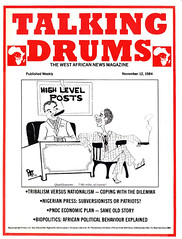Wanted: new leaders in Chad
By Ben Mensah
The time has come for the present leaders to be changed to give peace a chance in Chad and in the OAU. The OAU summit in Addis Ababa, instead of adopting a patient attitude over Chad as suggested by the Congolese Foreign Minister should reject the pretensions of both Hissen Habre and Goukouni Weddeye and help the people of Chad to identify new leaders who can end the war.On the eve of its summit the worst news to reach the secretariat of an organisation as incoherent and controversial as the Organisation of African Unity is the failure of the latest attempt in Brazzaville to solve the crisis in Chad.
For with the failure, the Chad crisis which in the past was a source of threat to the survival of the OAU, will re- emerge on the summit agenda alongside another disruptive issue, the Western Sahara impasse between Polisario and Morocco.
A clue to the explosive nature of the Western Sahara conflict is the threat issued last week by King Hassan of Morocco to withdraw his country, a founding member from the Organisation if the Polisario Front is admitted at the next summit in Addis Ababa on November 12.
This year's summit in Ethiopia, far from being constructive on account of it being held in a less-controversial venue which also is the secretariat of the Organisation, is rather likely to be stormier than previously. For even the one enemy against whom the entire continent has readily united to criticise, has managed to draw a wedge among the members as was evident at the recent inconclusive meeting of the leaders of Eastern and Southern African countries. I am referring to the famous Nkomati agreement through which apartheid South Africa has succeeded to blunt criticisms of its policies by erstwhile radical and vocal leaders of Mozambique and Angola.
With the swelling of the ranks of countries like Malawi, Swaziland etc which have traditionally refrained from criticising South Africa, the next summit of the OAU is by no means going to have it easy rallying overwhelming condemnation of a country they clandestinely do business with.
The failure of the talks on Chad in Brazzaville is however, of more significance to the war weary people of that country who face the possibility of a renewed civil war as soon as the French troops complete their withdrawal, than to OAU, a moribund Organisation that portrays the failures of the African continent more than its success.
The talks collapsed ostensibly over the reported insistence by the regime of Hissen Habre that it be recognised by the other participants as the country's legal government which prompted one of the factions to comment that the country government in Ndjamena had come to the talks only "to get themselves anointed and had not been interested in the real problems."
But there was no doubt that the talks were conducted in an atmosphere of suspicion engendered by accusations that each side was preparing to resume the civil war.
Mr Gouara Lassoum, the Foreign Minister of Hissen Habre charged that Libyan troops had been on the alert in northern Chad and that Goukouni Weddeye's forces hoped to be in Ndjamena by December.
This was countered by Mr Adoum-Yacoub Kougou, a foreign policy aide to Mr Goukouni Weddeye who said Hissene Harbre was preparing aggression. This atmosphere enabled the rival leaders to once more exhibit their intransigence and selfishness which alone account for the perpetuation of the crisis in Chad.
Various previews of the Brazzaville conference suggested that the participants should be guided by the history of the crisis which shows that at least one of the former leaders, Felix Malloum set an example in patriotism when he agreed at a similar conference in Lagos to step down from the Presidency to enable others to take over.
The reviews urged that if the present leaders who incidentally are the ones who took over from Felix Malloum, failed to be guided by history and persisted in their vanity, they should all be dumped in favour of a new leadership.
Regrettably, both Hissen Habre and Goukouni Weddeye have failed to take note of these previews which were aimed at helping to resolve the more than two decade old war.
By their behaviour they have failed to transform into lasting peace the current lull in the war.
Another opportunity to bring peace to the poor and hungry people of Chad has therefore been squandered by the same leaders who have turned this personal conflict into a civil war.
Yet Mr Antoine Ndinga Oba, the Congolese Foreign Minister under whose chairmanship the meeting was held did not only describe the breakdown as a 'temporary separation' but also noted that the path to peace in the complex Chad tragedy was necessarily long and therefore required patient effort. This view of the Congolese Minister is as regrettable as the failure of the talks and should not be endorsed by his colleagues in the Organisation of African Unity.
For after two decades of existence the OAU cannot continue to be soft on two war lords who have made their a source of the OAU's disintegration and above all subjected the innocent people of Chad to poverty, hunger, disease and death in a fratricidal war.
The time has therefore come for the two to be removed from the scene to give peace a chance in Chad and in the OAU. The OAU summit in Addis Ababa instead of adopting a patient attitude over Chad as suggested by the Congolese Foreign Minister should reject the pretensions of both Hissen Habre and Goukouni Weddeye and help the people of Chad to identify new leaders
